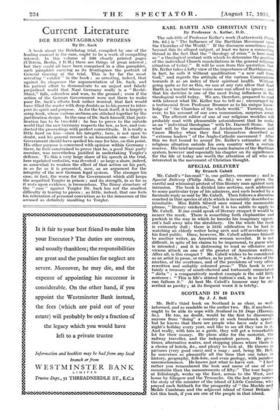KARL BARTH AND CHRISTIAN UNITY By Professor A. Keller, D.D.
The sub-title of Professor Keller's work (Lutterworth Press, 10s. 6d.) is "The Influence of the Barthian Movement upon the Churches of the World." If the discourse sometimes goes beyond this its alleged subject, at least we have a connecting thread in the fact that the "theology of crisis" is here used as " a theological sextant with which to determine the position of the individual Church constellations in the general religious situation of today." It will be seen from this quotation that Dr. Keller takes a lofty view of the importance of Barthianism ; in fact, he calls it without qualification "a new call from God," and regards the attitude of the various Communions towards it as an index of their spiritual health. Without going quite so far as this, we can at any rate allow that Karl Barth is a teacher whose voice none can afford to ignore ; and that his doctrine is one of the most living influences in the theological world today. We are, therefore, prepared to read with interest what Dr. Keller has to tell us • encouraged by a testimonial from Professor Brunner as to his unique know- ledge of "the Churches of the whole world." Turning, how- ever, to his account of our own communion, surprises await us. The efficient editor of one of our religious weeklies will probably read with pleasurable astonishment that he ranks as an "individual theologian" with Dr. Darwell Stone. But what will be the sensations of Archdeacon Rawlinson and Canon Mozley when they find themselves described as "extreme leaders" of the Anglo-Catholic movement ? After this we feel bound to accept Dr. Keller's estimates of the religious situation outside his own country with a certain reserve. His brief account of the main features of the Barthian system, however and especially his chapter on its significance for the life of today are worth the attention of all who are interested in the movement of Christian thought.


































 Previous page
Previous page